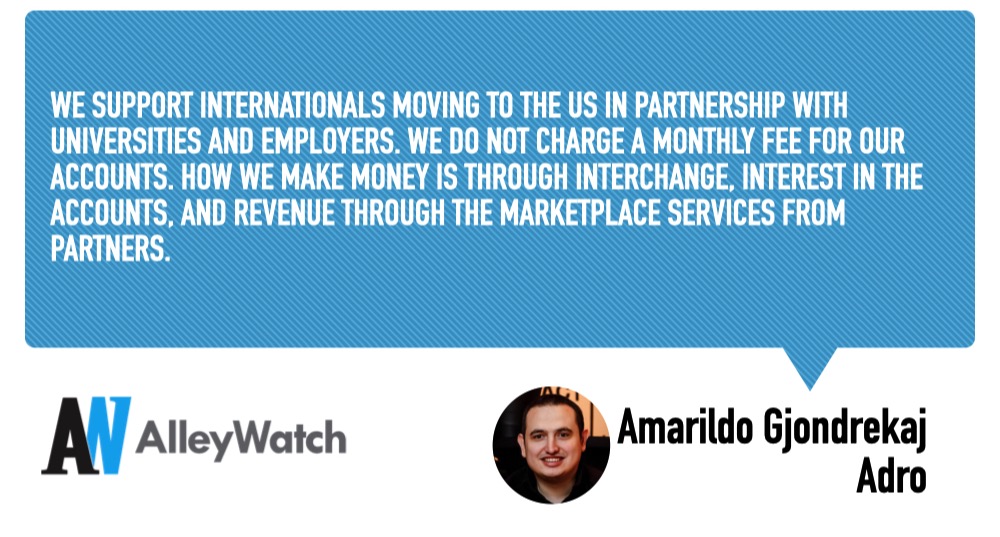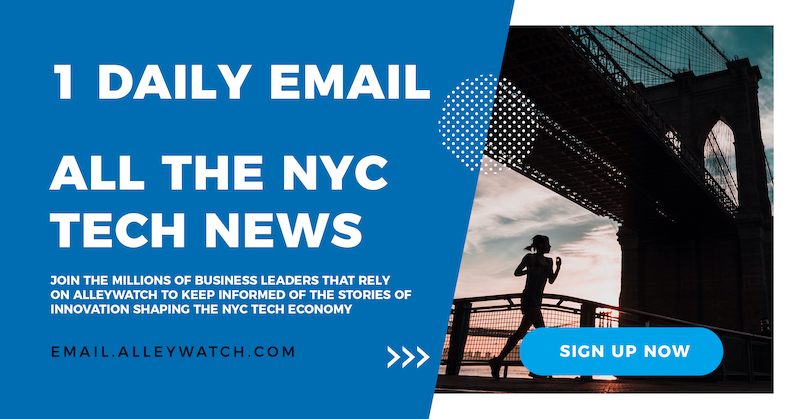Over 1 million international students are enrolled in universities across the United States, contributing an estimated $40B to the US economy and supporting over 360,000 jobs. Despite these economic ramifications, the path to integrating international students into the financial services and banking ecosystems is fraught with barriers. Adro is a financial services platform specifically designed for international students to gain access to the US banking system and build credit histories. The platform offers both checking and savings accounts, credit cards, and international money transfers free of monthly charges. Adro also partners with universities to provide financial literacy resources to ensure that newly arrived students understand basic budgeting and do not become victims of financial scams. The work with students starts even before they land in the United States, allowing them to establish an account from anywhere in the world while also minimizing the time a student is without banking services. Adro is pre-launch with plans to go live this summer.
AlleyWatch caught up with Adro CEO and Cofounder Amarildo Gjondrekaj to learn more about the inspiration for the business, the company’s strategic plans to empower international students with financial services, recent round of funding, and much, much more…
Who were your investors and how much did you raise? Pre-seed. Investors include Era, Ex Nihilo Ventures, and Cornell Tech Syndicate.
Tell us about the product or service that Adro offers.
We are a financial services platform that helps internationals establish their lives in the US. We give them access to checking and savings accounts, a credit card and global money transfers, plus a marketplace of immediately useful partner services and products like SIM cards, insurance, and other discounts.
What inspired the start of Adro?
 I spent my career in payments, with 7 years at Mastercard. That was my day job, my night job was teaching. I have been teaching for about 4 years, at schools like Cornell, CUNY Baruch, and Yeshiva.
I spent my career in payments, with 7 years at Mastercard. That was my day job, my night job was teaching. I have been teaching for about 4 years, at schools like Cornell, CUNY Baruch, and Yeshiva.
The problem that internationals faced with getting access to banking products kept coming up in my classes. Students were being heavily vetted by the school before being given an acceptance offer. The US government vets them before issuing a visa. However, banks and other financial institutions don’t have access to the individual’s background, so internationals were largely invisible to them. This isn’t a legal issue, it’s an information problem.
I saw a lot of the challenges international students faced with accessing financial services compared to domestic students. From opening their first account, to building credit while waiting for the arrival of their Social Security number, internationals were cobbling together solutions from multiple vendors.
How is Adro different?
We work with internationals before they arrive in the US and pre-collect their information. This allows us to support them from the day they enter the country, with everything they need to start spending, saving and getting settled in.
Adro partners with organizations that are invested in the success of internationals. We work closely with universities and employers to provide account access and improve financial literacy.
We’re different from larger banks and fintechs that mainly serve US citizens and permanent residents, in that we don’t require an SSN or credit history to apply for an account.
What market does Adro target and how big is it?
International students and workers, $37B total addressable market.
There was over 1M total international students in the 2022/2023 academic year, which breaks down to about 300k new students coming in annually.
What’s your business model?
We support internationals moving to the US in partnership with universities and employers. We do not charge a monthly fee for our accounts. How we make money is through interchange, interest in the accounts, and revenue through the marketplace services from partners.

How are you preparing for a potential economic slowdown?
The world of education is relatively stable, and some programs, like graduate business degrees, are actually counter-cyclical. People go back to school when the economy is down.
What was the funding process like?
Raising capital is a lot like dating. You’ve got to talk to a lot of VCs and be prepared to hear a lot of maybe’s and no’s, before you start getting to yes. Remember, you only need a few people to say ‘yes.’
We were looking for partners who could align with our mission to help internationals become financially visible.
What are the biggest challenges that you faced while raising capital?
It’s been a difficult market to raise in. Some funds were further into the round, and only cutting follow on checks. For others, they wanted to see traction and usage. However, we needed capital to establish bank relationships and sponsorships. Era, Ex Nihilo Ventures and Cornell Tech Syndicate were all familiar with the fintech payments space, and really understood what we were building and the stage we were at.
What factors about your business led your investors to write the check?
Our investors understand the problem we’re solving and can relate to the pain points of internationals moving to the US. One of the first angel checks we ever got was from someone who moved to the US 20+ years ago. They experienced the same frustrations of opening their first checking account or building credit.
Our investors understand the problem we’re solving and can relate to the pain points of internationals moving to the US. One of the first angel checks we ever got was from someone who moved to the US 20+ years ago. They experienced the same frustrations of opening their first checking account or building credit./
What are the milestones you plan to achieve in the next six months?
We’ll be launching our initial product suite (checking accounts, savings accounts, debit and credit cards, international money transfers, and perks center).
What advice can you offer companies in New York that do not have a fresh injection of capital in the bank?
You need to be scrappy and negotiate. Sometimes you need to say no to things that are out of your budget and find alternatives. If you can cut your salary as a founder, you give yourself more time to find product/market fit.
When a pre-seed/seed VC fund says your idea is too early, they are often rejecting you softly. What really helped us was getting to a quick ‘No’ with funds. This helped us allocate more time to those key conversations. Getting a quick ‘Yes’ is very rare.
Where do you see the company going now over the near term?
Our launch target date is July 1st, 2024
What’s your favorite restaurant in the city?
cka ka qellu – The best Albanian food in NYC (I’m Albanian, so this is a great reminder of home)
Tsuru Ton Tan in Union Square.
You are seconds away from signing up for the hottest list in NYC Tech!
Sign up today
- SEO Powered Content & PR Distribution. Get Amplified Today.
- PlatoData.Network Vertical Generative Ai. Empower Yourself. Access Here.
- PlatoAiStream. Web3 Intelligence. Knowledge Amplified. Access Here.
- PlatoESG. Carbon, CleanTech, Energy, Environment, Solar, Waste Management. Access Here.
- PlatoHealth. Biotech and Clinical Trials Intelligence. Access Here.
- Source: https://www.alleywatch.com/2024/04/adro-banking-platform-international-students-us-credit-card-checking-amarildo-gjondrekaj/




